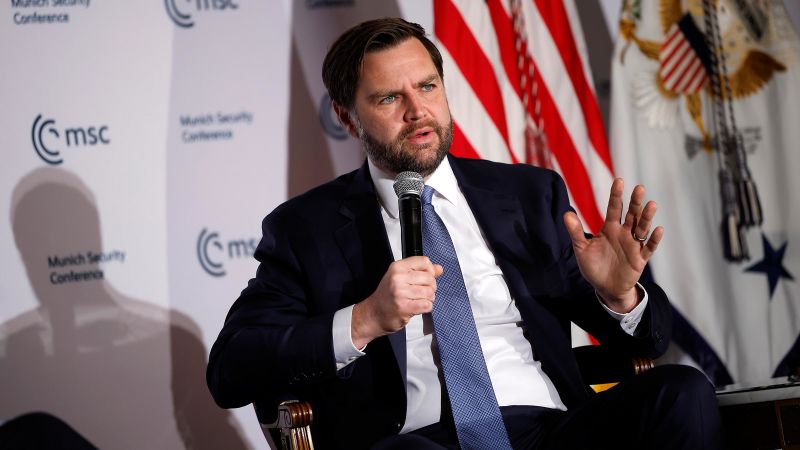Vice President JD Vance made headlines on Wednesday during a Q&A session at the Munich Leaders Meeting in Washington, D.C., where he expressed his views regarding the ongoing conflict between Russia and Ukraine. Vance emphasized that the Russian government is “asking for too much” in its conditions to end the war and called for direct negotiations between both sides. This statement reflects an evolving perspective on the war, which has drawn international attention and further complicates relations not just in Eastern Europe, but globally.
In his remarks, Vice President Vance articulated that he does not believe the Russian Federation is entirely uninterested in reaching a resolution. However, he suggested that the demands put forth by Moscow are excessive at this stage. “Right now, the Russians are asking for a certain set of requirements, a certain set of concessions… We think they’re asking for too much,” he asserted. This position aligns with the broader sentiment among Western nations that any future peace discussions must take realistic expectations into account. Furthermore, Vance’s comments held significant weight given that this meeting was his second address to the Munich Leaders Meeting in recent months, indicating a sustained dialogue on a pressing geopolitical issue.
The atmosphere surrounding Vance’s comments was further compounded by President Donald Trump’s remarks, who, when questioned about Vance’s statements, seemed unaware but still acknowledged that it “may” align with his own views on the situation. Trump reiterated the administration’s frustration, stating there exists a finite tolerance for negotiations that fail to yield positive results. He indicated that decisions would soon need to be made regarding the ongoing conflict, signifying an urgency that underscores the administration’s approach as it grapples with a complex international landscape.
During Vance’s presentation, he also referenced the transition from a proposed 30-day ceasefire to a more comprehensive dialogue that would seek long-term solutions rather than temporary fixes. “What the Russians have said… is a 30-day ceasefire is not in our strategic interest,” he quoted, stressing that the focus must shift to foundational talks about a broader settlement. This pivot is crucial in understanding the dynamics between both sides and the potential pathways toward peace.
Moreover, Vance stressed that direct communication between Russia and Ukraine is paramount for any effective resolution. He articulated a desire for both nations to establish a dialogue framework, insisting, “We would like both the Russians and the Ukrainians to actually agree on some basic guidelines for sitting down and talking to one another.” This call for direct engagement is critical, as mediated solutions often require the foundation of direct negotiations.
Despite the bleakness surrounding the prospect of peace, Vance expressed cautious optimism. He maintained that he is “not yet a pessimist” regarding the chances of the conflict’s resolution, highlighting a humanitarian approach shared by Trump, which promotes an end to the destructive pursuits of war. Vance asserted that continuing the conflict is detrimental not only to those directly involved but also for regional and global stability.
In tandem, Keith Kellogg, Trump’s envoy to Ukraine and Russia, noted that Russian President Vladimir Putin’s refusal to agree to a ceasefire hampers progress toward peace. Kellogg pointed out that it stands in Putin’s strategic interest to accept such proposals, given the reality that “the Russians are not winning this war”. This further underscores the political and military nuances that complicate these discussions.
Adding to this complexity, President Volodymyr Zelensky of Ukraine has rejected Putin’s proposal for a limited ceasefire and has reaffirmed his support for a more extensive truce, looking ahead to lasting stability rather than temporary pauses in hostilities. Vance, drawing from a nuanced understanding of these geopolitical currents, pointed out that both Europe and the United States remain aligned in their values and security interests—a vital element in addressing the current crisis.
Vance’s statements suggest an attempt to mend relations with European allies while also acknowledging the need to rethink their defense procurement and collaboration in response to heightened threats. As he concluded his public remarks, he acknowledged past controversies yet appeared to bolster constructive dialogue with allies.
In summary, the calls for direct negotiation and assessments of both Russian and Ukrainian positions reflect a significant shift towards seeking a diplomatic route, underlining the need for cool heads to prevail in what remains an increasingly volatile and complex international conflict.



